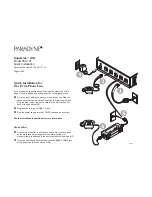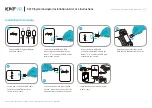
S e n d d o c u m e n t a t i o n c o m m e n t s t o m d s f e e d b a c k - d o c @ c i s c o . c o m
34-9
Cisco MDS 9000 Family CLI Configuration Guide
OL-16184-01, Cisco MDS SAN-OS Release 3.x
Chapter 34 Configuring Certificate Authorities and Digital Certificates
Configuring CAs and Digital Certificates
To authenticate the certificate of the CA by cutting and pasting the certificate from an e-mail message
or a website, follow these steps:
Note
For subordinate CA authentication, the full chain of CA certificates ending in a self-signed CA is
required because the CA chain is needed for certificate verification as well as for PKCS#12 format
export.
Configuring Certificate Revocation Checking Methods
During security exchanges with a client (for example, an IKE peer or SSH user), the MDS switch
performs the certificate verification of the peer certificate sent by the client and the verification process
may involve certificate revocation status checking.
You can use different methods for checking for revoked sender certificates. You can configure the switch
to check the CRL downloaded from the CA (see the
“Configuring a CRL” section on page 34-14
), you
can use OSCP if it is supported in your network, or both. Downloading the CRL and checking locally
does not generate traffic in your network. However, certificates can be revoked between downloads and
your switch would not be aware of the revocation. OCSP provides the means to check the current CRL
on the CA. However, OCSP can generate network traffic that can impact network efficiency. Using both
local CRL checking and OCSP provides the most secure method for checking for revoked certificates.
Command
Purpose
Step 1
switch#
config t
switch(config)#
Enters configuration mode.
Step 2
switch(config)#
crypto ca authenticate admin-ca
input (cut & paste) CA certificate (chain) in PEM format;
end the input with a line containing only END OF INPUT :
-----BEGIN CERTIFICATE-----
MIIC4jCCAoygAwIBAgIQBWDSiay0GZRPSRIljK0ZejANBgkqhkiG9w0BAQUFADCB
kDEgMB4GCSqGSIb3DQEJARYRYW1hbmRrZUBjaXNjby5jb20xCzAJBgNVBAYTAklO
MRIwEAYDVQQIEwlLYXJuYXRha2ExEjAQBgNVBAcTCUJhbmdhbG9yZTEOMAwGA1UE
ChMFQ2lzY28xEzARBgNVBAsTCm5ldHN0b3JhZ2UxEjAQBgNVBAMTCUFwYXJuYSBD
QTAeFw0wNTA1MDMyMjQ2MzdaFw0wNzA1MDMyMjU1MTdaMIGQMSAwHgYJKoZIhvcN
AQkBFhFhbWFuZGtlQGNpc2NvLmNvbTELMAkGA1UEBhMCSU4xEjAQBgNVBAgTCUth
cm5hdGFrYTESMBAGA1UEBxMJQmFuZ2Fsb3JlMQ4wDAYDVQQKEwVDaXNjbzETMBEG
A1UECxMKbmV0c3RvcmFnZTESMBAGA1UEAxMJQXBhcm5hIENBMFwwDQYJKoZIhvcN
AQEBBQADSwAwSAJBAMW/7b3+DXJPANBsIHHzluNccNM87ypyzwuoSNZXOMpeRXXI
OzyBAgiXT2ASFuUOwQ1iDM8rO/41jf8RxvYKvysCAwEAAaOBvzCBvDALBgNVHQ8E
BAMCAcYwDwYDVR0TAQH/BAUwAwEB/zAdBgNVHQ4EFgQUJyjyRoMbrCNMRU2OyRhQ
GgsWbHEwawYDVR0fBGQwYjAuoCygKoYoaHR0cDovL3NzZS0wOC9DZXJ0RW5yb2xs
L0FwYXJuYSUyMENBLmNybDAwoC6gLIYqZmlsZTovL1xcc3NlLTA4XENlcnRFbnJv
bGxcQXBhcm5hJTIwQ0EuY3JsMBAGCSsGAQQBgjcVAQQDAgEAMA0GCSqGSIb3DQEB
BQUAA08nKaGr0g0NIJaqNgLh0AFcT0rEyuyt/WYGPzksF9Ea
NBG7E0oN66zex0EOEfG1Vs6mXp1//w==
-----END CERTIFICATE-----
END OF INPUT
Fingerprint(s): MD5
Fingerprint=65:84:9A:27:D5:71:03:33:9C:12:23:92:38:6F:78:12
Do you accept this certificate? [yes/no]:
y
Prompts you to cut and paste the
certificate of the CA. Use the same
name that you used when declaring the
CA.
Note
The maximum number of trust
points you can authenticate to
a specific CA is 10.
















































